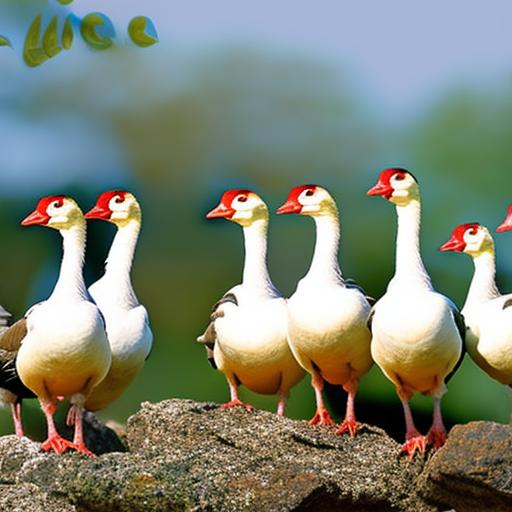Domestic geese are a popular choice for many farmers and homesteaders due to their versatility and usefulness. They are often kept for their meat, eggs, and feathers, and are also valued for their ability to control pests and weeds in the garden. Geese are hardy birds that can adapt to a wide range of climates, but they are particularly sensitive to hot weather. In this article, we will explore the effects of hot weather on domestic geese and discuss the best practices for keeping them healthy and comfortable during the summer months.
Understanding the Effects of Hot Weather on Domestic Geese
Hot weather can have a significant impact on the health and well-being of domestic geese. Like all birds, geese do not have sweat glands and rely on panting and evaporative cooling to regulate their body temperature. When the temperature rises, geese can quickly become overheated, leading to heat stress and heat stroke. In addition to the direct effects of high temperatures, hot weather can also lead to dehydration, which can further exacerbate the risk of heat-related illness. It is important for goose owners to understand the signs of heat stress and take proactive measures to prevent and manage these issues during the summer months.
Heat Stress and Heat Stroke in Domestic Geese
Heat stress occurs when a goose’s body temperature rises above normal levels, leading to discomfort and potential health problems. Common signs of heat stress in geese include panting, drooping wings, and a reluctance to move or eat. If left untreated, heat stress can progress to heat stroke, which is a life-threatening condition that requires immediate intervention. Heat stroke can cause neurological symptoms such as disorientation and seizures, and can quickly lead to death if not addressed promptly. It is crucial for goose owners to be vigilant for signs of heat stress and take steps to keep their birds cool and comfortable in hot weather.
Dehydration and Water Requirements for Domestic Geese
Dehydration is a common concern for domestic geese during hot weather. Geese require a significant amount of water to stay properly hydrated, and they can quickly become dehydrated if they do not have access to an adequate water source. In addition to drinking water, geese also use water for bathing and cooling off, making it even more important to ensure that they have access to clean, fresh water at all times. Goose owners should regularly check their birds’ water supply and provide additional water sources if necessary, especially during periods of extreme heat.
Providing Shade and Cooling Methods for Domestic Geese
One of the most effective ways to help geese stay cool in hot weather is to provide ample shade and cooling methods. This can be accomplished by offering access to shaded areas such as trees, shrubs, or structures, as well as providing artificial cooling methods such as misters or fans. Additionally, some goose owners choose to create shallow pools or ponds for their birds to wade in, which can provide both a source of water and a way to cool off. By offering a variety of cooling options, goose owners can help their birds stay comfortable and reduce the risk of heat-related illness.
Importance of Proper Ventilation in Hot Weather for Domestic Geese
Proper ventilation is essential for maintaining a comfortable environment for domestic geese during hot weather. Good ventilation helps to remove excess heat and humidity from the goose’s living space, which can help to prevent heat stress and heat stroke. Goose owners should ensure that their birds’ housing is well-ventilated, with plenty of airflow to keep the air moving and prevent the buildup of heat. This can be accomplished by providing open windows, vents, or other openings that allow for the free exchange of air. Additionally, it is important to avoid overcrowding, as this can lead to poor air quality and increased heat stress.
Monitoring and Managing Hot Weather Hazards for Domestic Geese
Monitoring and managing hot weather hazards is an ongoing task for goose owners during the summer months. This includes regularly checking on the birds to ensure that they are not showing signs of heat stress, as well as taking proactive measures to keep them cool and comfortable. In addition to providing shade, water, and ventilation, goose owners should also be mindful of other potential hazards such as sunburn and overheated ground surfaces. By staying vigilant and taking proactive steps to manage hot weather hazards, goose owners can help to ensure the health and well-being of their birds.
Signs of Heat-Related Illness in Domestic Geese
It is important for goose owners to be familiar with the signs of heat-related illness in their birds. Common symptoms of heat stress and heat stroke in geese include panting, drooping wings, disorientation, seizures, and a reluctance to move or eat. If any of these signs are observed, it is crucial to take immediate action to cool the bird down and seek veterinary care if necessary. By being aware of the signs of heat-related illness, goose owners can intervene quickly and prevent serious health problems from developing.
Preventing Hot Weather Hazards in Domestic Geese
Preventing hot weather hazards in domestic geese requires a proactive approach that includes providing ample shade, water, and ventilation, as well as monitoring the birds for signs of heat stress. In addition to these measures, goose owners can also take steps to reduce the overall temperature in the birds’ living space, such as using reflective roofing materials or providing additional cooling methods. By taking a comprehensive approach to preventing hot weather hazards, goose owners can help to keep their birds healthy and comfortable during the summer months.
Caring for Domestic Geese in Hot Weather
Caring for domestic geese in hot weather requires attention to detail and a proactive approach to managing potential hazards. By understanding the effects of hot weather on geese and taking steps to provide shade, water, and ventilation, goose owners can help to keep their birds cool and comfortable during the summer months. It is important to be vigilant for signs of heat-related illness and take immediate action to address any issues that arise. By following these best practices, goose owners can help to ensure the health and well-being of their birds, even in the hottest weather.
Meet Walter, the feathered-friend fanatic of Florida! Nestled in the sunshine state, Walter struts through life with his feathered companions, clucking his way to happiness. With a coop that’s fancier than a five-star hotel, he’s the Don Juan of the chicken world. When he’s not teaching his hens to do the cha-cha, you’ll find him in a heated debate with his prized rooster, Sir Clucks-a-Lot. Walter’s poultry passion is no yolk; he’s the sunny-side-up guy you never knew you needed in your flock of friends!







